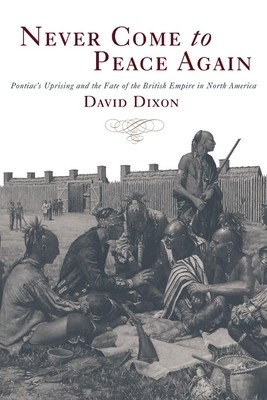
- We will send in 10–14 business days.
- Author: David Dixon
- Publisher: University of Oklahoma Press
- ISBN-10: 0806144629
- ISBN-13: 9780806144627
- Format: 15.5 x 23 x 2.3 cm, softcover
- Language: English
- SAVE -10% with code: EXTRA
Reviews
Description
Prior to the American Revolution, the Ohio River Valley was a cauldron of competing interests: Indian, colonial, and imperial. The conflict known as Pontiac's Uprising, which lasted from 1763 until 1766, erupted out of this volatile atmosphere. Never Come to Peace Again, the first complete account of Pontiac's Uprising to appear in nearly fifty years, is a richly detailed account of the causes, conduct, and consequences of events that proved pivotal in American colonial history. When the Seven Years' War ended in 1760, French forts across the wilderness passed into British possession. Recognizing that they were just exchanging one master for another, Native tribes of the Ohio valley were angered by this development. Led by an Ottawa chief named Pontiac, a confederation of tribes, including the Delaware, Seneca, Chippewa, Miami, Potawatomie, and Huron, rose up against the British. Ultimately unsuccessful, the prolonged and widespread rebellion nevertheless took a heavy toll on British forces. Even more devastating to the British was the rise in revolutionary sentiment among colonists in response to the rebellion. For Dixon, Pontiac's Uprising was far more than a bloody interlude between Great Britain's two wars of the eighteenth century. It was the bridge that linked the Seven Years' War with the American Revolution. David Dixon is Professor of History at Slippery Rock University, Pennsylvania. He is the author of the award-winning book Hero of Beecher Island: The Life and Military Career of George A. Forsyth.
EXTRA 10 % discount with code: EXTRA
The promotion ends in 15d.04:27:57
The discount code is valid when purchasing from 10 €. Discounts do not stack.
- Author: David Dixon
- Publisher: University of Oklahoma Press
- ISBN-10: 0806144629
- ISBN-13: 9780806144627
- Format: 15.5 x 23 x 2.3 cm, softcover
- Language: English English
Prior to the American Revolution, the Ohio River Valley was a cauldron of competing interests: Indian, colonial, and imperial. The conflict known as Pontiac's Uprising, which lasted from 1763 until 1766, erupted out of this volatile atmosphere. Never Come to Peace Again, the first complete account of Pontiac's Uprising to appear in nearly fifty years, is a richly detailed account of the causes, conduct, and consequences of events that proved pivotal in American colonial history. When the Seven Years' War ended in 1760, French forts across the wilderness passed into British possession. Recognizing that they were just exchanging one master for another, Native tribes of the Ohio valley were angered by this development. Led by an Ottawa chief named Pontiac, a confederation of tribes, including the Delaware, Seneca, Chippewa, Miami, Potawatomie, and Huron, rose up against the British. Ultimately unsuccessful, the prolonged and widespread rebellion nevertheless took a heavy toll on British forces. Even more devastating to the British was the rise in revolutionary sentiment among colonists in response to the rebellion. For Dixon, Pontiac's Uprising was far more than a bloody interlude between Great Britain's two wars of the eighteenth century. It was the bridge that linked the Seven Years' War with the American Revolution. David Dixon is Professor of History at Slippery Rock University, Pennsylvania. He is the author of the award-winning book Hero of Beecher Island: The Life and Military Career of George A. Forsyth.


Reviews